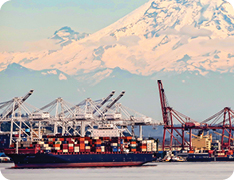 The Washington Department of Revenue (DOR) revised Washington Administrative Code (WAC) Section 458-20-193, known as Rule 193, to change the definition of the location where the goods are considered received. Sellers of goods that weren’t previously subject to Washington’s Business and Occupation (B&O) tax could now be subject to the tax. And the buyer could be subject to retail sales tax.
The Washington Department of Revenue (DOR) revised Washington Administrative Code (WAC) Section 458-20-193, known as Rule 193, to change the definition of the location where the goods are considered received. Sellers of goods that weren’t previously subject to Washington’s Business and Occupation (B&O) tax could now be subject to the tax. And the buyer could be subject to retail sales tax.
While the new sourcing rules and examples provided may seem straightforward, the changes introduce certain ambiguities. First, it’s unclear whether the DOR can, by regulation, disregard an actual agency relationship. Second, although the revisions are effective for tax reporting periods beginning on or after August 7, 2015, the DOR has published guidance indicating it may attempt to expand the scope of the revision to transactions occurring before the effective date of the rule change. The DOR noted in January 2016 that Rule 193 may be “treated as an interpretive statement that may apply retroactively” absent a statute change, unless there’s been reliance on the prior rule.
More recently, the DOR quoted the revision in a January 2017 determination but identified it as a change effective March 28, 2010. Regardless of the ambiguities, it’s important to understand the specifics of the rule change and how they may impact current transactions.
A Closer Look at What's Changed
The revision, which is effective for tax reporting periods beginning on or after August 7, 2015, modified the definition of receipt from “purchaser or its agent first taking possession” of property to exclude agents.
Under the new Rule 193, “receive and receipt doesn’t include possession by a shipping company on behalf of the purchaser, regardless of whether the shipping company has the authority to accept and inspect the goods on behalf of the purchaser.” In this context, shipping company includes those that are wholly owned, so the test must be applied at the individual legal entity level.
The Old Rule
Under the previous Rule 193, agents—including freight forwarders and for-hire carriers—could receive goods on behalf of purchasers under very specific circumstances. Purchasers could grant these agents written authority to physically examine the goods for the purchaser and accept or reject the goods based on the examination. In other words, the previous rule recognized that various principal–agent relationships exist.
If the agent performed these actions in Washington, the sale was a Washington sale; however, if the agent performed these actions before the goods entered Washington, it was a non-Washington sale.
How This May Impact Your Business
Out-of-State Businesses
If a Washington customer of a non-Washington seller authorizes an agent—a shipping company or even an affiliate or wholly owned subsidiary, for example—to inspect and take possession of goods outside of Washington, the DOR may treat these as a Washington sale. This makes it subject to B&O tax and applicable retail sales tax if the seller has nexus and no exemptions or deductions apply.
The new Rule 193 shouldn’t impact the sourcing if a Washington customer:
- Picks up the goods outside of Washington using its own equipment
- Inspects and accepts or rejects the goods at an out-of-state location
- Takes physical possession at an out-of-state location
The DOR would likely deem these sales as non-Washington sourced sales.
Washington Businesses
If a nonresident authorizes an agent to receive goods in Washington for ultimate delivery outside of Washington, the DOR may deem these sales as non-Washington sourced sales, which aren’t subject to B&O tax or retail sales when applicable.
Next Steps
Consider performing a nexus analysis to determine whether your business has established Washington physical presence or economic nexus. Here are some other steps to explore:
- Review shipping arrangements for Washington wholesale customers that arrange for pick-up outside of Washington via separate entities, and review the annual sales volumes for these customers. A B&O tax filing obligation may exist if sales exceed Washington’s wholesaling economic nexus threshold.
- Review shipping arrangements for non-Washington customers that arrange for pick-up in Washington via separate entities. Sellers may be able to source these sales outside of the state, exempting them from B&O tax and retail sales tax. Similarly, non-Washington customers that purchase goods from Washington sellers should review shipping arrangements. There may no longer be the need to avoid agency inspection at pick-up due to B&O tax and retail sales tax.
- Consider entering into the Washington voluntary disclosure program to limit assessment years and qualify for penalty abatements if you’re an unregistered seller that’s established Washington nexus in any way. Specific criteria must be met in order to participate in this program, so consult with your tax advisor before contacting the DOR.
- Consider requesting a refund of overpaid taxes from the DOR if you over-remitted B&O tax or retail sales tax. Your tax advisor can help you make this determination.
Now is a good time to take a fresh look at your shipping arrangements, contracts, and books to determine the tax implications of this change as you prepare your 2017 tax packages.
We're Here to Help
If you have questions about how to source sales and whether your company has established nexus, contact your Moss Adams professional or email statetax@mossadams.com. We can help you make a nexus determination as well as assist with entering into a voluntary disclosure agreement and becoming compliant for future periods.